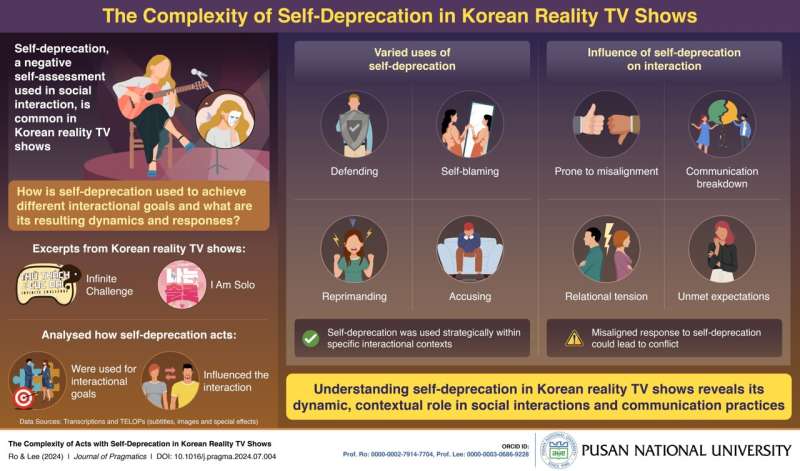This article has been reviewed according to Science X's editorial process and policies. Editors have highlighted the following attributes while ensuring the content's credibility:
fact-checked
trusted source
proofread
New study uncovers the complex dynamics of self-deprecating remarks in Korean entertainment

Self-deprecation, a negative self-assessment used in social interaction, is prevalent in Korean reality TV shows. Traditionally, psychology views self-deprecation as indicative of low self-esteem or related psychological disorders, such as depression or eating disorders.
In a recent study by Professors Eunseok Ro from Pusan National University and Josephine Mijin Lee from Ewha Womans University, the focus shifts from a pathological view to an interactional one, revealing the complex dynamics of self-deprecation in social interactions. Their study, published online in the Journal of Pragmatics, suggests that self-deprecating remarks often serve broader interactional purposes.
"Existing research has primarily analyzed data where self-deprecation is the central topic of the conversation. The present study contributes to an endogenous understanding of acts with self-deprecation by examining interactional episodes where the relevance of self-deprecation is momentarily suspended until other interactional exigencies are resolved," explain Profs. Ro and Lee.
The researchers analyzed three excerpts from Korean TV shows, Infinite Challenge and I Am Solo. Through detailed conversation analysis, they examined the participants' self-deprecating actions, the responses they elicited, and the interactional consequences.
In Infinite Challenge, self-deprecation was used as a defense against a false accusation, leading to a humorous interaction. The excerpt analyzed highlights how participants created humor by breaching social norms around minimizing agreement with self-criticism. Conversely, in I Am Solo, self-deprecation was used to self-blame, reprimand, and accuse to solicit an apology.
Further, the excerpts from I Am Solo demonstrated how misinterpreting self-deprecation can lead to unmet expectations, communication breakdowns, and relational tension. These examples underscore the complexity of self-deprecation in social interactions, where its meaning can vary widely depending on context. For instance, in I Am Solo, Gwangsu misinterpreted Yeongsook's self-deprecation as self-aggrandizement.
When Yeongsook intended her self-criticism as an accusation, Gwangsu responded with consolation rather than an apology. Such misunderstandings can lead to emotional reactions, as seen in Yeongsook's tears. Therefore, self-deprecation should be handled carefully to avoid negative outcomes, as these examples reveal.
"Our findings reveal that self-deprecation can serve different interactional goals, such as defense, reprimand, and accusation, depending on the context. Responses to self-deprecation vary widely and can lead to misalignments, misunderstandings, and relational tension," observes Profs. Ro and Lee.
Sensitivity to self-deprecating remarks is crucial to avoid unfortunate consequences. Sensitivity to self-deprecating remarks is crucial to avoid negative outcomes, as responses depend on the specific context and participants' goals.
In conclusion, the study illustrates the complexity of self-deprecation within conversational contexts. Self-deprecation is not merely a negative self-assessment but a strategic tool for achieving various interactional goals. The findings emphasize the importance of understanding the specific context and underlying expectations behind self-deprecating remarks to navigate interactions effectively and empathetically.
By developing a sequentially sensitive approach to self-deprecation, this study deepens our understanding of this practice in social interaction.
More information: Ro et al, The complexity of acts with self-deprecation in Korean reality TV shows, Journal of Pragmatics (2024). DOI: 10.1016/j.pragma.2024.07.004
Provided by Pusan National University





















